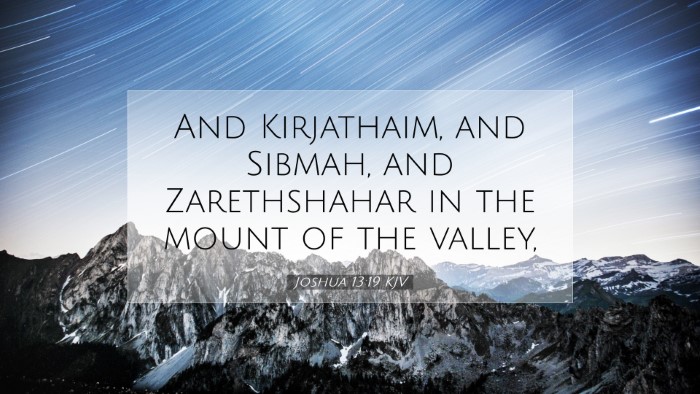Commentary on Joshua 13:19
Joshua 13:19 states: "And the city of the sun, which is Hazor, in the land of the tribe of Naphtali." This verse mentions Hazor, a significant city during the conquest of Canaan, contextualizing its place within the inheritance allotted to the tribes of Israel. The mention of Hazor as "the city of the sun" draws attention to both its geographical significance and possibly its religious importance.
Historical Context
The phrase "the city of the sun" has been widely interpreted to relate to Hazor's position and prominence among the Canaanite cities. According to Matthew Henry's commentary, Hazor was a notable site for its fortified structures and strategic location. It represented not only a religious center but also a political powerhouse during the time of the Judges.
The Significance of Hazor
Albert Barnes notes that Hazor is identified with the royal city of the Canaanites, which had a formidable reputation. It was once the head of the Canaanite coalitions against Israel, as illustrated in Judges 4 and 5. Its destruction by Joshua marked a pivotal moment in the Israelite conquests and symbolized divine judgment against Canaanite idolatries.
The Tribe of Naphtali
The allocation of Hazor to the tribe of Naphtali, as referenced in this verse, reflects divine providence in the division of the land. Matthew Henry elaborates on how the inheritance given to each tribe in Canaan was purposeful and that this particular allocation to Naphtali symbolizes blessings based on faithfulness and the mission of that tribe to conquer their territory.
Theological Implications
The location and importance of Hazor evokes several theological reflections. Adam Clarke suggests that its designation as "the city of the sun" may have idolatrous connotations, perhaps linked to sun worship prevalent among Canaanites. Theologically, this presents a stark contrast with the Israelite worship of Yahweh, highlighting the spiritual battles present during the conquest.
Application for Believers
For modern believers, the narrative surrounding Hazor serves as a potent reminder of the ongoing struggle between light and darkness, truth and falsehood. In light of this, pastors are encouraged to delve into how contemporary believers can remain vigilant against forms of idolatry that may exist in modern culture. As laid out in Clarke's observations, understanding the historical and spiritual context of cities like Hazor can help inform our personal faith journeys.
Conclusion
Joshua 13:19 encapsulates significant historical, theological, and moral lessons. The fate of Hazor reminds us of God’s sovereignty over nations and individual lives, the persistent call to worship Yahweh alone, and the importance of understanding our biblical heritage. As scholars and students of the Bible, we should engage deeply with these narratives, as they hold transformative truths for our faith and practice today.
Further Reflections
- Hazor's Legacy: Consider how the historical significance of Hazor can inspire contemporary ministry approaches.
- Cultural Context: Reflect on the influence of Canaanite culture and how similar influences challenge today’s church.
- Faith and Conquest: Explore how the trust in God's promises guided the Israelites in their conquests, paralleling personal faith journeys.


